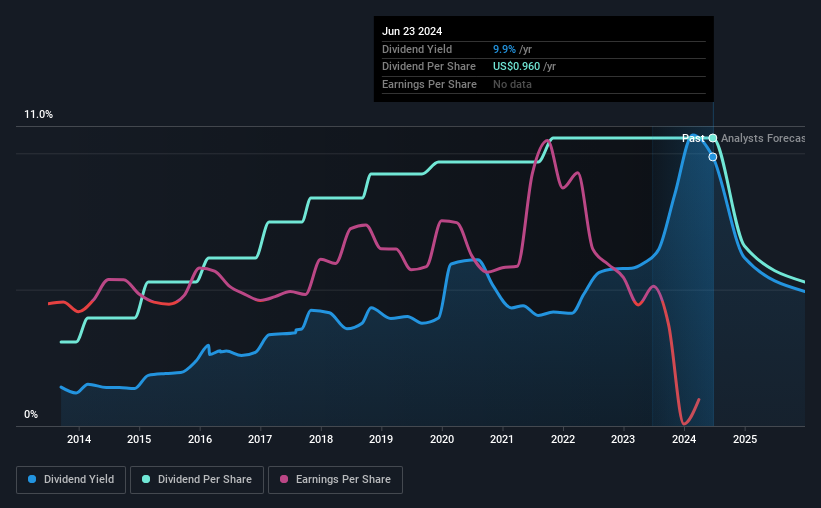We Wouldn't Be Too Quick To Buy Kennedy-Wilson Holdings, Inc. (NYSE:KW) Before It Goes Ex-Dividend
Some investors rely on dividends for growing their wealth, and if you're one of those dividend sleuths, you might be intrigued to know that Kennedy-Wilson Holdings, Inc. (NYSE:KW) is about to go ex-dividend in just four days. The ex-dividend date is one business day before a company's record date, which is the date on which the company determines which shareholders are entitled to receive a dividend. It is important to be aware of the ex-dividend date because any trade on the stock needs to have been settled on or before the record date. Accordingly, Kennedy-Wilson Holdings investors that purchase the stock on or after the 28th of June will not receive the dividend, which will be paid on the 5th of July.
The company's next dividend payment will be US$0.12 per share, on the back of last year when the company paid a total of US$0.96 to shareholders. Last year's total dividend payments show that Kennedy-Wilson Holdings has a trailing yield of 9.9% on the current share price of US$9.73. Dividends are a major contributor to investment returns for long term holders, but only if the dividend continues to be paid. That's why we should always check whether the dividend payments appear sustainable, and if the company is growing.
Check out our latest analysis for Kennedy-Wilson Holdings
Dividends are usually paid out of company profits, so if a company pays out more than it earned then its dividend is usually at greater risk of being cut. Kennedy-Wilson Holdings reported a loss after tax last year, which means it's paying a dividend despite being unprofitable. While this might be a one-off event, this is unlikely to be sustainable in the long term. Given that the company reported a loss last year, we now need to see if it generated enough free cash flow to fund the dividend. If cash earnings don't cover the dividend, the company would have to pay dividends out of cash in the bank, or by borrowing money, neither of which is long-term sustainable. Kennedy-Wilson Holdings paid out more free cash flow than it generated - 157%, to be precise - last year, which we think is concerningly high. We're curious about why the company paid out more cash than it generated last year, since this can be one of the early signs that a dividend may be unsustainable.
Click here to see how much of its profit Kennedy-Wilson Holdings paid out over the last 12 months.
Have Earnings And Dividends Been Growing?
Companies with falling earnings are riskier for dividend shareholders. If earnings decline and the company is forced to cut its dividend, investors could watch the value of their investment go up in smoke. Kennedy-Wilson Holdings reported a loss last year, and the general trend suggests its earnings have also been declining in recent years, making us wonder if the dividend is at risk.
Many investors will assess a company's dividend performance by evaluating how much the dividend payments have changed over time. Since the start of our data, 10 years ago, Kennedy-Wilson Holdings has lifted its dividend by approximately 13% a year on average.
Get our latest analysis on Kennedy-Wilson Holdings's balance sheet health here.
The Bottom Line
Is Kennedy-Wilson Holdings worth buying for its dividend? First, it's not great to see the company paying a dividend despite being loss-making over the last year. Second, the dividend was not well covered by cash flow." It's not an attractive combination from a dividend perspective, and we're inclined to pass on this one for the time being.
Although, if you're still interested in Kennedy-Wilson Holdings and want to know more, you'll find it very useful to know what risks this stock faces. In terms of investment risks, we've identified 3 warning signs with Kennedy-Wilson Holdings and understanding them should be part of your investment process.
Generally, we wouldn't recommend just buying the first dividend stock you see. Here's a curated list of interesting stocks that are strong dividend payers.
Have feedback on this article? Concerned about the content? Get in touch with us directly. Alternatively, email editorial-team (at) simplywallst.com.
This article by Simply Wall St is general in nature. We provide commentary based on historical data and analyst forecasts only using an unbiased methodology and our articles are not intended to be financial advice. It does not constitute a recommendation to buy or sell any stock, and does not take account of your objectives, or your financial situation. We aim to bring you long-term focused analysis driven by fundamental data. Note that our analysis may not factor in the latest price-sensitive company announcements or qualitative material. Simply Wall St has no position in any stocks mentioned.
Have feedback on this article? Concerned about the content? Get in touch with us directly. Alternatively, email editorial-team@simplywallst.com

 Yahoo Finance
Yahoo Finance 
